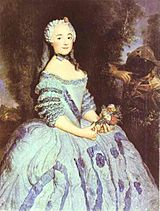Jean-Baptiste de Boyer, Marquis d'Argens facts for kids
Quick facts for kids
Jean-Baptiste de Boyer, Marquis d'Argens
|
|
|---|---|
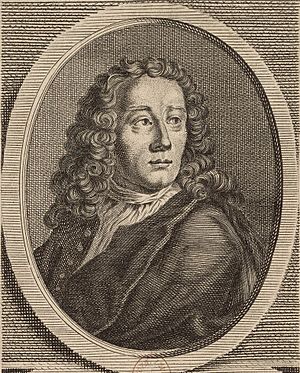
Jean-Baptiste de Boyer, Marquis d'Argens
|
|
| Born | 24 June 1704 Aix-en-Provence, France |
| Died | 11 January 1771 (aged 66) Château de La Garde Toulon |
| Occupation | Philosopher and author |
| Nationality | French |
|
Philosophy career |
|
| Era | Age of Enlightenment |
| Region | French philosophy |
| School | Rationalism, Epicureanism, Pelagianism |
|
Main interests
|
Political philosophy, literature, historiography, biblical criticism |
|
Notable ideas
|
Toleration, Freedom of religion, Freedom of speech, Separation of church and state |
|
Influences
|
|
Jean-Baptiste de Boyer, Marquis d'Argens (1704–1771) was a French writer and thinker. He was known for his logical way of thinking, called rationalism. He also wrote many books and was a critic of the Catholic Church.
He was a close friend of the famous writer Voltaire. Jean-Baptiste spent much of his life living away from France. He stayed at the court of Frederick the Great, who was the King of Prussia.
Contents
A Young Rebel: Jean-Baptiste's Early Life
Jean-Baptiste de Boyer was born on June 24, 1704. His hometown was Aix-en-Provence in southern France. He was the oldest of seven children. His parents were Pierre-Jean de Boyer and Angélique de L'Enfant.
His father, Pierre-Jean de Boyer, was a high-ranking lawyer. He worked for the Regional Parliament of Provence. His family belonged to the Noblesse de robe. This group of nobles got their rank from holding important jobs in law or government. Unlike other nobles, they often worked very hard.
In those days, the oldest son was usually expected to follow in his father's footsteps. He was also expected to marry and have children. But Jean-Baptiste did not want to be a lawyer. His family was very religious, but he became a rationalist. This meant he believed in using reason and logic. He also became a critic of the Church. He once wrote, 'I was not my father's favourite child.'
To keep family wealth together, younger sons often had to stay unmarried. Three of his four younger brothers joined a religious group called the Knights of Malta. Another brother became a priest. Jean-Baptiste refused to follow these family rules. Because of this, he lost his right to inherit family property in 1734. His younger brother, Alexandre, inherited it instead. Even with their different ideas, Jean-Baptiste and Alexandre remained good friends.
In 1749, Jean-Baptiste married Babette Cochois. She was a French dancer and writer. They had a daughter named Barbe. After living in Berlin for many years, he went back to France in 1769. He died on January 11, 1771, at the Château de La Garde.
A Career in Arts and Ideas
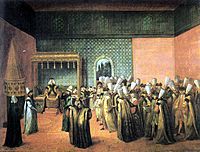
The de Boyer family had a history in the arts, not just law. Jean-Baptiste's great-uncle was a poet and playwright. His grandfather owned a famous art collection. It included works by famous artists like Titian and Caravaggio.
In 1719, Jean-Baptiste's father bought him a position in the army. It was in the Régiment de Toulouse. In 1722, his father became 'Marquis d'Argens'. Jean-Baptiste, as the oldest son, also used this title. In 1722, he left home with an actress and went to Spain. He was brought back to France by soldiers. One of these soldiers was Vicomte d'Andrezel. He was about to become the French ambassador in Constantinople. He convinced Jean-Baptiste's father to let his son go with him. They left Toulon at the end of 1723.
D'Argens returned to France in 1724. For a few years, he studied law and even worked on some legal cases. A famous legal case in 1731 made him decide against a legal career. It also made him strongly oppose the Catholic Church and the Jesuits.
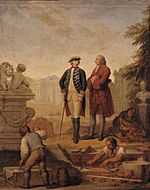
He rejoined the army in 1733 during a war. He was wounded in battle and later badly injured in a fall from his horse in 1734. This ended his time in the military.
After being formally disinherited, he moved to the Netherlands. There, he started his writing career. He published his first book, Mémoires de Monsieur le Marquis D'Argens, in 1735. This was followed by Lettres juives. This book was published in six parts between 1736 and 1740. It was very popular.
In 1742, he accepted an offer from Frederick the Great. He became a Royal Chamberlain in Berlin. He spent most of his career there. He was also made Director of the Belles-Lettres section of the Prussian Academy of Arts. He also directed the Berlin State Opera. He met Babette Cochois when he visited Paris to find performers. They married in 1749.
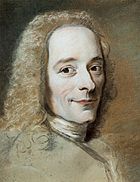
In 1738, d'Argens made up with his family. His brothers helped him. He then received money from his family each year. He could also use the family home in Provence for winter. In 1763, his brother Alexandre joined him in Berlin. Alexandre had been sent away from France. As Voltaire noted, one brother was exiled for being against the Jesuits, and the other for supporting them.
D'Argens left Berlin for the last time in 1769. He returned to Provence. He died on January 11, 1771, while visiting his sister.
Important Writings and Ideas
D'Argens was part of the Age of Enlightenment movement in France. This movement was led by thinkers like Voltaire and Montesquieu. They believed society should be based on reason, not just faith. They also supported the idea of separation of church and state. This means the government and religious groups should be separate.
Besides Lettres juives, his other important works include Lettres chinoises and Lettres cabalistiques. He also wrote Mémoires secrets de la république des lettres. This book was later updated and called Histoire de l'esprit humain.
He also wrote six novels. The most famous one is Thérèse Philosophe. This book was published without an author's name. D'Argens himself said he did not write it. So, there is some debate about whether it was truly his work.
Novels
- Thérèse Philosophe (1748) (Thérèse Finds Happiness, Black Scat Books, 2020. ISBN: 1734816635; Theresa the Philosopher, Grove Press, 1970. ASIN B000VRJX50)
See also
 In Spanish: Jean-Baptiste de Boyer para niños
In Spanish: Jean-Baptiste de Boyer para niños
 | Stephanie Wilson |
 | Charles Bolden |
 | Ronald McNair |
 | Frederick D. Gregory |


